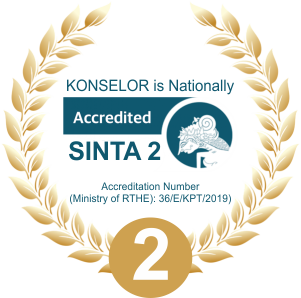Depth of relationship counseling review counselor version
 ), M. Ramli(2),
), M. Ramli(2), (1) Universitas Indraprasta PGRI Jakarta
(2) Universitas Negeri Malang
 Corresponding Author
Corresponding Author
Copyright (c) 2023 Sisca Folastri, M. Ramli M. Ramli
DOI : https://doi.org/10.24036/02022112119743-0-00
Full Text:
 Language : en
Language : en
Abstract
Keywords
References
Amen, Z. N., & Counseling, F. I. P. (2019). Personal qualities of the counselor. Available in h ttps://www. researchgate. net/publication/318563019. Retrieved date, 8.
BOND, T. G., YAN, Z., STONE, G., & BELTYUKOVA, S. (2015). Making measures, setting standards, and Rasch regression. In Applying the Rasch model: fundamental measurement in the human sciences (pp. 187–225). Routledge.
Corey, G. (2012). Theory and practice of counseling and psychotherapy. Cengage learning.
Di Malta, G., Evans, C., & Cooper, M. (2020). Development and validation of the relational depth frequency scale. Psychotherapy Research, 30(2), 213–227.
Folastri, S., Rangka, I. B., & Ifdil, M. (2017, September). Student's Self-concept Profile Based on Gender: a Rasch Analysis. In 9th International Conference for Science Educators and Teachers (ICSET 2017) (pp. 264-269). Atlantis Press.
Geldard, D., Geldard, K., & Foo, R. Y. (2017). Basic personal counselling: A training manual for counsellors. Cengage AU.
https://osf.io/kt7d4/?view_only=0e4d71c95e8e4238a71714134407a48c
Linacre, J. M. (2011). A user’s guide do Winstep Ministep: Rasch-model computer program. winsteps. com. Chapter, 18, 567–573.
Mearns, D., & Cooper, M. (2005). Working at relational depth in counselling and psychotherapy. Sage.
Mearns, D., Thorne, B., & McLeod, J. (2013). Person-centred counselling in action. Sage.
Mulawarman, M. (2017). Basic counseling skills. Semarang: Unnes.
Nugraheni, E. P., Princess, A., & Febrianti, T. (2020). Counseling Psychology: An Introduction to Educational Counselors. Prenada Media.
Princess, A. (2016). Theenting of Kualitas Pribadi Konselor in Konseling for Membangun Hubungan Antar Konselor and Konseli. In Jurnal Bimbingan Counseling Indonesia (Vol. 1).
Sanyata, S. (2006). Value Perspectives In Counseling: Building Effective Interactions Between Counselors-Clients. Paradigm, 1(02).
Schmid, P. F. , & M. D. (2006). Being-with and being-counter: Person-centered psychotherapy as an in-depth co-creative process of personalization/Miteinander-Sein und Gegenüber-Sein... Person-Centered & Experiential Psychotherapies, 5(3), 174–190.
Sofia, N. (2017). Unconditional loving: the application of the "unconditional positive regard" model. Journal of RAP (Actual Research on Psychology, Padang State University), 6(1), 45-56.
Sumintono, B., & Widhiarso, W. (2014). Application of rasch model for social sciences research (revised edition). Trim Communimunitarian Publishing House.
Sumintono, B., & Widhiarso, W. (2015). Application of rasch modeling in educational assessment. Trim communion.
Skeletal, I. B., Prasetyaningtyas, W. E., Satrianta, H., & Folastri, S. (2017). Career Planning Profiles of Vocational High School Students with Rasch Modeling By Gender. Counselor, 6(2), 39-48.
Wilkins, P. (2015). Person-centred therapy: 100 key points. Routledge.
Wiggins, S., Elliott, R., & Cooper, M. (2012). The prevalence and characteristics of relational depth events in psychotherapy. Psychotherapy Research, 22(2), 139–158.
 Article Metrics
Article Metrics
 Abstract Views : 375 times
Abstract Views : 375 times
 PDF Downloaded : 108 times
PDF Downloaded : 108 times
Refbacks
- There are currently no refbacks.
Copyright (c) 2023 Sisca Folastri, M. Ramli M. Ramli

This work is licensed under a Creative Commons Attribution 4.0 International License.







